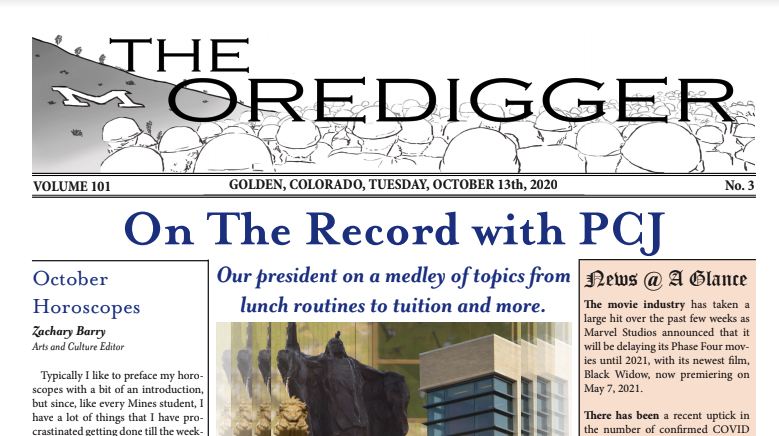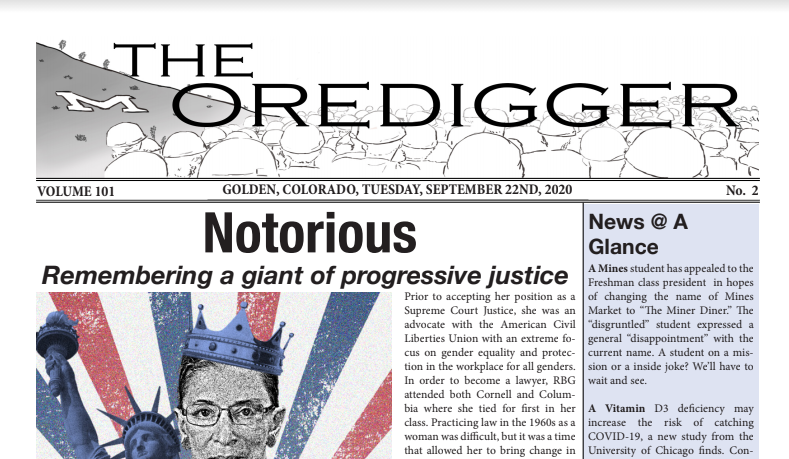It is spring time at the Colorado School of Mines and for many people that means looking for or looking forward to starting a job in a few months. For those of us looking to work in the petroleum industry, it is quite a time! Although our age group has massive unemployment, that hides the fact that our industry is booming. Any graduate that wants to work, will. Freshmen that have expressed an interest in petroleum engineering are offered internships and paid three times the country’s average salary. It’s a good place to be, and we should all be thankful of the paths that brought us here.
At the same time, however inflated salaries might appear, they still do not reflect the true value that a recent CSM graduate could bring to a company. This is because we are at the nexus of two tremendous booms: technological breakthroughs in oil extraction, and a massive growth in computing power and the ease with which it can be accessed. Everyone here has heard of hydraulic fracturing and how it has unlocked reservoirs once thought uneconomic. At the same time, Amazon now has servers that offer literally unlimited computing power to anyone with a desktop, tablet, or smartphone at scalable pricing. Even more importantly, the code needed to harness this power is being taught to grade school children. It is no longer the domain of specialists, but of the masses.
Our generation is unique. Many of us were born before Windows ’95 was rolled out. We may remember our first website visit, or life before the iPhone. Our generation is the driving force for the transformation of the world into digital space, and oftentimes the first users of technologies that have fundamentally changed the way we live and communicate (Facebook, Skype, Kayak, Pandora, etc.).
How does this relate to our jobs in a few months? Very simply, we have the experience and ability to remake an industry that in many ways has not changed since the last oil boom forty years ago. There is a massive amount of value at stake: trillions of dollars of not only physical oil and gas molecules that the world will use to live on, but also billions of dollars of efficiency hours that can be saved and used to increase productivity.
One concrete example is right in our backyard: Wattenberg Field. This oil field in the Denver Basin has been producing since the 1970s, but amazingly it will produce more oil this year than ever before. The reservoir that is driving that production today is the Niobrara Formation. The Niobrara exists throughout the Rocky Mountain basins, but it is only truly economic in Wattenberg Field. What characterizes the Niobrara in Wattenberg Field is a subsurface measurement of resistivity. High resistivity indicates the Niobrara will produce millions of barrels of oil; low resistivity is not (currently) economic.
Millions of wells have been drilled in the United States over the decades, and each has electric logs that were run to test the rocks for certain properties like resistivity. These logs are public property held by the state where the well was drilled. Geologists interpret logs, traditionally by looking at printed sheets that fold on to each other inches thick. Computer programs today allow geologists to interpret on a screen instead, but the process is mostly the same– look at each individual log and note its properties. It is time consuming and repetitive work. Worse, every company looks at the same logs every time. Yes, different interpreters and shifts in geologic thinking affect outcomes. But the bulk of the work is repeated over and over again. This space is ripe for disruption.
In Wattenberg it is clear what the winning strategy was for the companies that positioned themselves in the best parts of the field. All available logs were loaded into a computer interpretation program. Each log was brought up, the Niobrara interval identified, and the average maximum resistivity value captured. A map was then made of these values, and the sweet spots identified.
To those not familiar with US onshore oil and gas exploration it is difficult to illustrate how much clicking, zooming, resizing, and squinting is involved. Each company that looked at Wattenberg exerted massive amounts of human energy. However, only three companies dominate Wattenberg because they were the fastest at identifying its potential and acquiring leases. Speed made the difference between billions of dollars, so it is necessary to ask, Where was the maximum effort exerted? Part of it was in identifying high resistivity as the driving force in Niobrara production. This thought process takes experience, and a geologist with twenty or more years in industry came up with the resistivity cutoff that defined Wattenberg Field. But the bulk of the process, the examination of thousands of wells and capturing of thousands of values, was a repeatable set of steps with clear inputs and outputs. Quality control is necessary but involves skills that are basic to any young petroleum geologist. With minimal computing power and programming, the identification and delineation of Wattenberg could have been automated once the resistivity cutoff was established. The company to have done so would have been first to the prize.
This is why our generation has unprecedented value to petroleum companies today. We have the skills to take a process that has remained unchanged for forty years and use the experience and creativity we gained by playing on and helping design the internet to increase efficiency a thousand fold. We still need the experience and guidance of the generations before us; that knowledge should not be lost! But we have at our fingertips computing power that was unimaginable when we sent men to the moon. And we have the flexibility to put it to use.
Unfortunately, companies do not always see this potential. Hiring and pay scales are still based on “years of experience”, roughly the amount of time someone chose to interact with an HR department. When interviewing, companies want to know the specific skills you bring to the advertised position, rather than the creativity potential you may own. Senior workers are given the most difficult projects, while young minds are made to languish with plug-and-chug assignments meant to “train” them. Managers and team leads are skeptical about new processes they do not understand.
This is one reason we have seen a rise in entrepreneurship. Thousands of people have quit jobs (or never taken them) because the corporate structure stifles their potential to create value.
As you take that new job this summer, remember you have abilities that may be incomprehensible to your bosses. Push the limits. Do not accept to sit there repeating a process over and over again when a simple macro would solve the problem and scale to the whole company. Companies should realize that years of experience no longer correlate with a person’s value. Those willing to ditch the HR rules and motivate their young employees to automate the identification of the next Wattenburg faster than the competition will be the ones to succeed.



'On Taking Jobs and Making Money' has no comments
Be the first to comment this post!